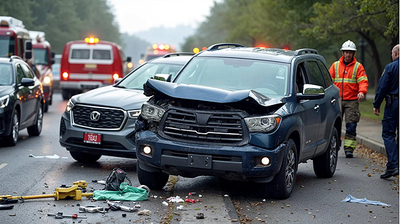Car Accident Myths That Could Cost You Thousands
 |
Car accidents are stressful, chaotic, and often confusing. You rarely see them coming and in those moments leading up to the accident, you’re often not even aware of what’s going to ensue. The worst part is that it doesn’t end there. Often, the aftermath of a car accident is even more stressful than the accident itself as you have to deal with insurance companies. And let’s face it, nobody likes to deal with them. Ever.
And when you find yourself stuck or not knowing what to do next, you usually turn to your close ones. With all the advice floating around from friends, family, or social media, it’s easy to fall for common myths that can hurt your chances of getting fair compensation.
Some of these myths seem harmless, but they can end up costing you thousands of dollars in missed benefits, denied claims, or underestimated injuries. Let’s
clear the air and break down the most common car accident myths—so you don’t make costly mistakes when it matters most.
> |
Myth #1: “If I feel fine, I don’t need to see a doctor.”
This is one of the most dangerous myths. Many people assume that if they don’t feel immediate pain after a crash, they must be fine. In reality, adrenaline can mask pain and you can experience a concussion after the accident or feel the real impact of the crash days later.
With more than 20 million people injured in road accidents per year, it’s important to take these situations seriously and get checked out even if you feel fine. If anything, the doctor can at least confirm that there’s nothing wrong with you.
On the other hand, waiting too long to get checked out not only puts your health at risk, but it can also hurt your insurance claim. Insurance companies often use gaps in treatment to argue that your injuries weren’t serious or weren’t caused by the accident.
So, the bottom line is, always see a medical professional after a crash, even if you feel okay. A timely diagnosis protects both your health and your legal rights.
Myth #2: “I should just let the insurance company handle everything.”
It’s tempting to believe the insurance company will take care of you. After all, that’s what you’ve been paying premiums for, right? Unfortunately, insurance adjusters work for the company, not for you. Their goal is to minimize payouts and close claims quickly.
You might be pressured to accept a much lower settlement before you’ve fully recovered, or even before you understand the full extent of your medical needs. That’s basically the way they work. They take advantage of you when you’re at your lowest.
You don’t have to accept the first offer, and you’re not required to give recorded statements without legal advice.
Myth #3: “I can’t afford an attorney.”
Many people think hiring an attorney is expensive and out of reach, especially after an accident when they’re already facing medical bills or lost income. But most car accident attorneys work on a contingency fee basis. That means you don’t have to give any money until they win your case.
This arrangement helps level the playing field between you and big insurance companies that have a huge amount of money to spend.
You can likely afford a lawyer, and in many cases, you can’t afford not to have one. A good attorney can significantly increase the value of your settlement.
Myth #4: “Minor accidents aren’t worth reporting.”
This is a very common misconception. If there’s only a small dent or scrape, most people think it’s better to just “work it out” with the other driver and skip calling the police or your insurance company.
But even seemingly minor accidents can result in hidden damage. Maybe you can’t see the car damage immediately but that won’t stop the car from malfunctioning or even breaking down a week later.
The other party could also later claim damages or injuries that weren’t discussed at the scene, leaving you legally vulnerable. It’s always better to deal with the issue immediately and make sure you’ve done everything you can to protect yourself.
Don’t forget to always document the accident, no matter how small. Take photos, exchange information, and file a police report if required.
Myth #5: “I was partially at fault, so I can’t get compensation.”
Finally, many people don’t realize that even if they were partly responsible for an accident, they may still be entitled to compensation. It all depends on their state of residency and the rules that apply there.
For example, if you were 20% at fault and the total damages were $10,000, you might still recover $8,000. It all depends on the regulations so it’s always advisable to double check these with your attoreny as well.
Don’t automatically assume you’re ineligible for compensation. It never hurts to try and get a fair settlement.
Final thoughts: Car accident myths & truths
Car accidents come with enough stress as it is. Don’t let misinformation or outdated advice make things worse—or cost you thousands of dollars in compensation. As you can see, most of the information we believe to be true is mostly just a widespread misconception.
Knowing the truth about how car accident claims work is one of the best ways to protect yourself after a crash or a collision.
If you’ve been in a car accident and aren’t sure what to do next, it’s okay to ask questions. A short conversation with an experienced attorney can help clear up confusion and give you peace of mind. And you don’t have to worry about their fee, as you only have to pay once the case if won.
Your health and your future are too important to leave to chance. Make sure to do your research and not make any rash decisions. Simply follow our advice if you need it and double-check each piece of information.


